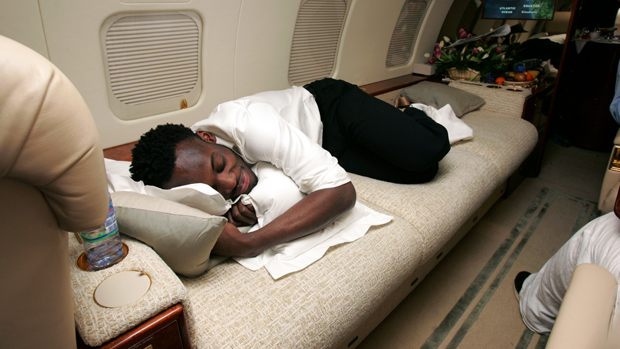Snooze you win
A good night’s sleep is as essential as fitness and nutrition – so here are Man United, Arsenal and England kip coach Nick Littlehales’ perfect cycles

10am kick-off
07:00
Set the alarm for 06:45 to be up and out of bed for 07:00 for breakfast, travelling to the game, preparation and warm-up.
07:30
Light and energy-focused breakfast ahead of the session.
09:30
Energy booster sports drink or high-carb snack prior to kick-off. “Caffeine-based sports drinks at this time won’t have as much of an adverse effect on your night-time recovery period as they would if taken later in the day.”
10:00
The big match.
12:45
A lunch of chicken and pasta – choice of the stars. “No more coffee after this point in the day: most people who perform in professional sport will cut caffeine out altogether or restrict it for up to 12 hours before they want to sleep,’’ says Littlehales.
14:00
Nap time: 40 winks now will improve levels of cortisol (stress hormone) in the blood. “Take an alarmed nap for 20-30 minutes, so you do not drift into the deep sleep stage,” says Littlehales. NB: an alarmed nap means one ending with an alarm, rather than panicked shut-eye.
19:30
“Be aware that your choice of meal can disrupt your recovery times,” says Littlehales. Spicy foods, rich desserts and, of course, alcohol have been shown to prevent deep, quality sleep if taken late in the day.
21:30
Time to wind down. “Get into a habit of sleep preparation by reducing artificial light and turning off computer games,” says Littlehales.
22:45
“11pm is the optimum time for the body to start its recovery cycle,” says Littlehales – so aim to be in bed by 22:45 at the latest.
3pm kick-off
06:45
“In any sleep routine it’s crucial to keep a constant waking time,” says Littlehales. Athletes who follow natural ‘circadian’ rhythms of the day – such as waking at around sunrise – have less sleep issues and recover quicker.
07:30
With an afternoon kick-off it may be preferable to ‘front load’ your energy by having a bigger breakfast, with protein and slow-release carbohydrates.
10:00
“With a 3pm kick-off and a free morning you can do light training sessions and warm up the muscles for the activity ahead,” says Littlehales.
11:30
A pre-match meal should be consumed approximately three to three-and-a-half hours before kick-off.
13:00
Some players will use a power nap as part of their pre-match preparation. That’s fine, but ensure you’re up and alert again by 13:30 to go through stretches and warm-up drills.
15:00
The big match.
20:00
“Avoid huge meals mid-evening,” warns Littlehales, “as leaving it too late to take food on board can stir up the digestive system and over-stimulate the brain – the last thing a player needs in preparation for bedtime.”
21:45
Sleep preparation. “A hot or cold shower or bath before bed can help promote sleep as changing body temperature shortly before bed can lead to better sleep and help reduce muscle soreness that could disrupt sleep,” says Littlehales.
22:45
Get into bed. “Aim to be asleep by 23:00 but if you’re struggling, don’t force it: get up and read or listen to music, then try to sleep again 90 minutes later,” says Littlehales.
8pm Kick-off
06:45
“Up you get,” says hard taskmaster Littlehales. “Stick to the plan and don’t be tempted to ‘lie in’ because you’re kicking off later in the day – this will only disrupt the pattern you’re trying to establish. Players who adhere to sleep cycles have seen a 54 per cent increase in alertness, awareness and reaction times.”
07:30
Begin with the first of a number of small meals through the day designed to supply energy without spiking blood sugar.
10:00
Prepare your muscles with a light training drill.
12:30
Kick-off is still over seven hours away so a meal at this point as opposed to a lighter snack is no problem. Cut-off point for caffeine intake too.
14:00
“You’re looking to maintain your sleeping and waking routine but also take advantage of the natural dip in your body’s clock around mid-afternoon – usually between 2pm and 4pm – to fit in a nap, so now’s the time to do just that,” advises Littlehales.
16:00
A walk or light stretch session in the late afternoon can loosen any stiffness and help prepare muscles for the evening. Follow up with a light, easily digestible meal.
20.00
The big match.
00.30
“The most disruptive element of night games is that it short-circuits your sleep programme,” says Littlehales. After a game you may want to eat or drink, and your adrenalin is still up - all of which means it’s unlikely that you’ll be prepared for sleep at 22:45. “Sup some camomile tea, which has been found to help induce sleep.”
Also see:
Five top tips to help you doze
Get FourFourTwo Newsletter
The best features, fun and footballing quizzes, straight to your inbox every week.
